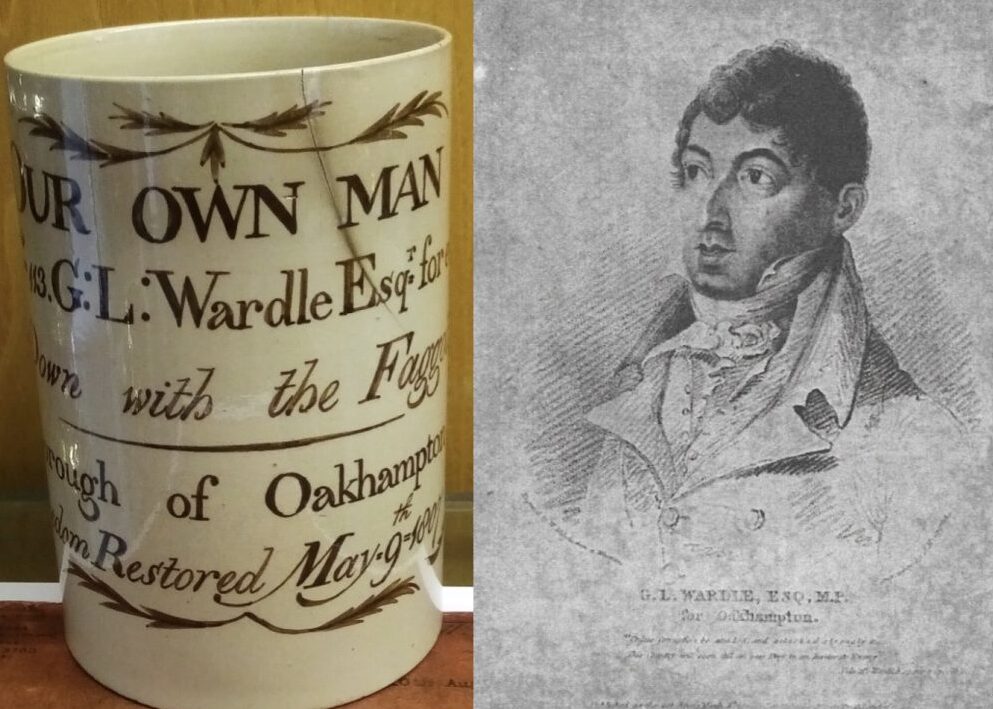The gentleman pictured is indeed the Honourable Gwyllym Lloyd WARDLE, Esquire. MP for Okehampton 1807 – 1812
n.b. Gwyllym is the Welsh spelling of William.
Vol 1 History of Okehampton EHY. 1931 Adapted and expanded J Goffey 2022 MoDL
This mug sits in the display cabinet in Okehampton Town Hall. Dating from 1807 it has intrigued all who look at it. Who was Mr Wardle and what were the Faggots? (not American slang in those days!)
The whole inscription reads:
Our Own Man
No. 113. G.L. Wardle Esq. For Ever
Down with the Faggots
Borough of Oakhampton
Freedom Restored May 9th 1807
Born about 1761, son of a Chester attorney of Hartsheath, nr. Mold, Flints. William was educated at Harrow and St. John’s College Cambridge. At 28, he married an heiress Ellen Love Parry of Madryn, Caernarvon, and became a member of the farming Landed Gentry and a magistrate.
In 1791 he was Sheriff of Flintshire, then of Anglesy, in 1802-3 and finally Caernarvon in 1803-4. Sponsored by Sir Watkin Williams Wynn, he commanded troops in the Irish rebellion and was a Captain In the Ancient British Dragoons in 1794, and Major in 1797, then a Lieut..Col. 1799-1800.
In 1801 he was one of the leading opponents of the proposed Menai Bridge scheme, having become involved in the rival speculative ventures of the Whig, William Alexander Madocks, in whose cloth factory at Tremadoc he was a partner.
In about 1804 he gained a reputation for advanced political views, and at the general election of 1807 he stood for Okehampton, having apparently been recommended by his attorney, one Corfield, who had connexions there, to a group of electors resentful of ‘some grossness’ (?) in the recent sale of the chief property interest in the borough. He topped the poll and was said to have received a total of 113 votes. On 22 June 1807 he took his seat with the Opposition as a Whig.
Hence the mugs which were filled with beer and given to the freeholders of the town. If they accepted a mug and drank the beer they had ‘pledged’ their vote to the donor. Only male property owners or ‘Freemen’ could vote and voting was by show of hands. Note this mug is indeed number 113, the winning vote!
A faggot voter or faggot was a person who qualified to vote in an election with a restricted suffrage (right to vote) only by the exploitation of loopholes in the regulations. Typically, faggot voters satisfied a property qualification by holding the title (deeds of ownership) to a subdivision of a large property with a single beneficial owner. Faggot voting was a common electoral abuse in the United Kingdom until the electoral reforms of the late 19th century. Men were temporarily ‘owners’ of a piece of a larger property which enabled them to vote for a specific person. As soon as the voting was over, the ‘title’ was returned to the property owner.
Wardle voted against the government in most of the important divisions of 1808, On 23rd June he raised the issue of army clothing contracts and argued that, by adhering to a system of private contracts, successive governments had wasted large sums of public money since 1803. He suggested that the commander-in-chief, the Duke of York, the King’s second son, had thwarted attempts to establish a fair and open system of public contract, but did not press the matter any further.
His portrait has a quote from this most important speech to Parliament:
“Unless corruption be attacked and attacked strongly too, this country will soon fall as easy Prey to an Inveterate Enemy”
(This sketch of him was done in London, hence the mis-spelling of Oakhampton. )
Historical documents state that In the first quarter of 1809, public attention was held by the scandal of the alleged involvement of the Duke of York, the king’s second son and commander-in-chief of the army, in the sale of commissions by his former mistress, Mrs. Mary Anne Clarke. After an open Commons inquiry, its instigator Gwyllym Wardle, radical Member for Okehampton, moved for the duke’s dismissal. His motion was crushed, but the Portland ministry’s resolutions affirming the duke’s innocence were opposed by such a substantial minority that the Duke resigned. The affair prompted popular calls for reform and sparked a series of parliamentary attacks on corruption in high places. But the Establishment prevailed and Mrs Clarke sued Mr Wardle, the Duke was reinstated and poor Mr Wardle bankrupted by the court costs.
Mr. Wardle left Parliament and retired to Florence to escape his creditors, and died there ‘in his 72nd year’, 30 Nov. 1833.










9 Responses
Your article helped me a lot, is there any more related content? Thanks! https://www.binance.info/register?ref=IHJUI7TF
tt88bet has been on my radar for a while. Finally checked it out and I’m impressed. The bonuses are pretty sweet. All players like getting bonuses as much as I do with tt88bet
Just spent some time on 88clb8me. It’s pretty straightforward, nothing too fancy, but it gets the job done. Give it a shot if you’re looking for something easy to get into: 88clb8me
Man, having the S666app8 on my phone is a game-changer. Quick access to all my favorite games, wherever I am. Download it here: s666app8.
Your article helped me a lot, is there any more related content? Thanks!
Seubete is a surprisingly good site. I found some very cool games that I had never come across before. Come join the fun at: seubete
Kubetvina, man, it’s quickly become my go-to spot. The interface is clean, and the games are fair. Easy to deposit and withdraw, which is a huge win! Check it out at kubetvina. Seriously, give it a shot!
Hey checked out casinobetk the other day! Pretty decent selection of games and the site was easy to navigate. Definitely worth a look if you’re hunting for something new. Check it out here: casinobetk
Can you be more specific about the content of your article? After reading it, I still have some doubts. Hope you can help me.